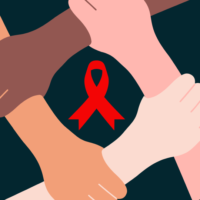Exploring the Complexities of Migrant Healthcare: Insights from a Panel Discussion
We’re thrilled to welcome Christopher Depenbrock as our new intern at Legal Council for Health Justice! At 18, Christopher has chosen to take a gap year to dive into his wide-ranging interests in aviation, US politics, business, social justice, and law. Drawn to our rich history of advocacy, especially for the LGBTQ+ community, he sees Legal Council as the perfect place to grow. Since joining, Christopher has already found the experience rewarding, and we’re excited to support him as he builds his skills in these vital areas.
Exploring the Complexities of Migrant Healthcare: Insights from a Panel Discussion
By Christopher Depenbrock
I recently attended a comprehensive virtual discussion by the Midwest AIDS Training + Education Center (MATEC) led by four panelists, each representing a different sector in facilitating access to HIV care, to discuss the many challenges faced by the vast migrant population in the city of Chicago. The objective of the discussion was to address the underlying challenges faced by newcomers to the United States and to integrate ideas from each sector’s perspective to help mitigate hardships being endured by overwhelmed and mostly non-English speaking individuals. Amy Martin, Legal Director of the AIDS Legal Program at Legal Council, was one of the panelists.
One of the key points raised was the misconception that language barriers are the primary challenge for migrants seeking care. Often, the real barrier is a lack of awareness. Many migrants simply don’t know where to seek help, what services they’re eligible for, or what documents are needed to access care. This gap in basic information creates significant delays in treatment, exacerbating health conditions and leaving individuals vulnerable.
Amy Martin, Legal Director of the HIV/AIDS Program at Legal Council, offered another perspective on this issue, highlighting the fear migrants may have about exposing their immigration status when seeking healthcare. Many aren’t aware that the healthcare system is confidential and separate from immigration enforcement, which can prevent them from getting the care they need. Listening to Amy, it became clear how essential the Legal Council’s role is in educating and protecting vulnerable communities, ensuring they understand their rights in a safe and supportive environment.
The panel also delved into the complexities of treating migrants with a range of health conditions, sometimes undiagnosed before their arrival in the U.S. Sarah Argentine, a nurse practitioner with Sinai Chicago specializing in infectious diseases, shared that many new arrivals, particularly from Colombia and Venezuela, come with chronic conditions like diabetes or tropical diseases. These conditions often go untreated due to a lack of prior medical testing, making it overwhelming for patients to navigate multiple diagnoses, especially in overcrowded shelters. The overload of information can also discourage migrants from seeking care, fearing the challenges might harm their families or themselves.
One particularly eye-opening discussion focused on the challenges surrounding PrEP (pre-exposure prophylaxis), a medication that can prevent HIV. Many migrants have never heard of PrEP, and their unfamiliarity with the U.S. healthcare system makes it difficult for them to access this preventive treatment. Argentine shared that her team is working hard to simplify the process, using technology and employing bilingual pharmacists to make instructions clear and accessible. Though these efforts are making a positive impact, she stressed that they are temporary solutions and that a more systemic approach to transparency in healthcare is necessary for long-term success.
What stood out most during the discussion was the emphasis on trust. Building trust between healthcare providers and patients through one-on-one conversations is key to empowering migrants to take charge of their health. It is important that legal teams work alongside healthcare providers to ensure that migrants understand their rights and feel supported. Trust also plays a crucial role in patient confidentiality—especially in the case of HIV care, where stigma and discrimination can cause immense fear and shame. Empowering those affected by HIV and working to eliminate stigma is essential for fostering strong patient-provider relationships.
The panel concluded with a call for collaboration. All the speakers agreed on the need for a city-wide, collaborative healthcare network, one that integrates various agencies and ensures that all information is kept up-to-date and easily accessible. They stressed that improving care for vulnerable populations, particularly migrants, requires a unified approach across sectors.
As I reflect on the panel discussion, my hope for a more inclusive and effective healthcare system has never been stronger. I’m excited to continue my work with the Legal Council and contribute to this vision of comprehensive, compassionate care for everyone. I hope this blog post serves as an insightful reminder of the work still needed to ensure dignity, opportunity, and access to healthcare for all.


